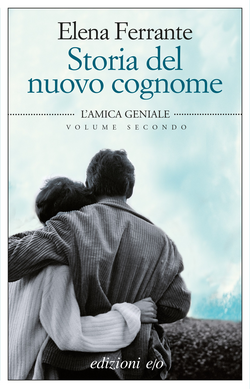Plot
The novel starts with the return of Lila and Stefano from their honeymoon on the Amalfi coast. Lila has a bruised face, and tells Lenù that she was beaten and sexually assaulted when she tried to resist Stefano on their vacation. To their horror, they realize that most of the neighborhood respects Stefano more after this, having considered Lila too unruly for a young girl.
Lila starts to work in the shoe shop her family is opening with the Solara brothers. She becomes pregnant, but has a miscarriage. Both Lila's and Stefano's families pressure her into becoming pregnant again, blaming Lila's independence for the miscarriage. A doctor recommends that she spends a season at sea to increase her fertility, and Lila, desperate to not be alone with her mother and sister-in-law, talks Elena into coming with her. Elena, who is secretly in love with Nino Sarratore, agrees on the condition that they go to the island of Ischia, knowing Nino will be there. Lila, Lenù, Nino, Lila's pregnant sister-in-law Pinuccia and Nino's friend Bruno Soccavo spend the days discussing literature and politics. Pinuccia develops a crush on Bruno, while Nino and Lila fall in love and begin an affair. When they spend the night together, Lenù, depressed and alone at the beach, gives in to the advances of Donato Sarratore, Nino's father, who harassed her a few years before, and with whom she has sex.
As the vacation comes to an end, Lenù, feeling rejected, focuses on her studies and meets less and less with Lila and Nino. When she is taking the Matura, the national exam to finish high school in Italy, one of the examiners tells her about the Scuola Normale di Pisa, where she can continue her education without any fees through a scholarship. Lenù decides to take an exam for the university, and wins a place there. Just before leaving, she goes to say good bye to Lila in the shoe shop, where she finds her with Nino, realizing they have resumed their affair.
Lila becomes pregnant, and decides to leave her husband to live with Nino. She disappears from the neighborhood for twenty-one days. Michele Solara asks Antonio, who is now working for him, to find her. Antonio finds the couple and beats up Nino, but does not tell Michele. Instead, he tells his childhood friends Enzo and Pasquale. Enzo helps Lila, taking her back to the neighborhood. Stefano is overjoyed that Lila is pregnant, not believing her when she says that the baby is not his, and the whole neighborhood decides to pretend that she was spending time with Lenù in Pisa.
In the meanwhile, Lenù has a hard time with her studies in Pisa, because of her poverty and lack of cultural capital, and because of the prejudices of other students, who mock her Neapolitan accent. She has a relationship with Franco Mari. At the end of her studies, she begins a relationship with Pietro Airota, the son of a renowned professor.
While preparing for her thesis, Lenù remains disturbed by her relation with Donato Sarratore, and writes about it in a notebook. One day, she receives a box with the possessions of her old schoolteacher, professor Oliviero, which includes The Blue Fairy, the book she had written with Lila when they were little girls, and recognizes in the book the heart of her writings. She gives the story she wrote to Pietro, who passes it on to his mother, Adele, who works at a publishing house. To Lenù's surprise, Adele calls her to say that she wants to publish the tale as a book.
Lila, in the meanwhile, has given birth to her son Gennaro (called Rino, like her brother). She spends a lot of time trying to educate the child, determined that he should have a better fate than the children of the neighborhood. Realizing that Stefano has been having an affair with Ada, and not being able to stand his violence anymore, she finally leaves him, and goes to live with Enzo in a working class neighborhood, San Giovanni a Teduccio. She starts working in the sausage factory that belongs to Bruno Soccavo. Lenù goes to visit her there, and finding her in awful conditions, gives her The Blue Fairy, which Lila claims she does not remember and then throws into a fiery furnace.
The novel ends when Lenù is in a bookstore presenting her book. She is attacked by a journalist, who calls the book obscene. To her surprise, an audience member starts to defend her, and she recognizes him as Nino Sarratore.
